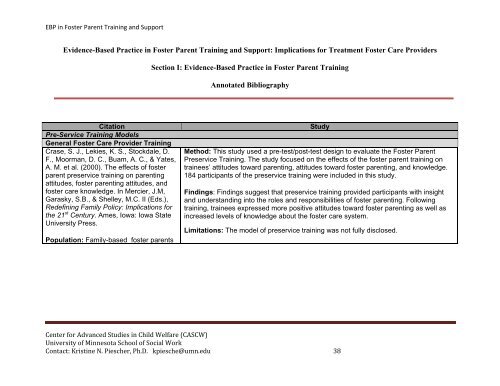Evidence-Based Practice in Foster Parent Training and Support ...
Evidence-Based Practice in Foster Parent Training and Support ...
Evidence-Based Practice in Foster Parent Training and Support ...
You also want an ePaper? Increase the reach of your titles
YUMPU automatically turns print PDFs into web optimized ePapers that Google loves.
EBP <strong>in</strong> <strong>Foster</strong> <strong>Parent</strong> Tra<strong>in</strong><strong>in</strong>g <strong>and</strong> <strong>Support</strong><strong>Evidence</strong>-<strong>Based</strong> <strong>Practice</strong> <strong>in</strong> <strong>Foster</strong> <strong>Parent</strong> Tra<strong>in</strong><strong>in</strong>g <strong>and</strong> <strong>Support</strong>: Implications for Treatment <strong>Foster</strong> Care ProvidersSection I: <strong>Evidence</strong>-<strong>Based</strong> <strong>Practice</strong> <strong>in</strong> <strong>Foster</strong> <strong>Parent</strong> Tra<strong>in</strong><strong>in</strong>gAnnotated BibliographyCitationPre-Service Tra<strong>in</strong><strong>in</strong>g ModelsGeneral <strong>Foster</strong> Care Provider Tra<strong>in</strong><strong>in</strong>gCrase, S. J., Lekies, K. S., Stockdale, D.F., Moorman, D. C., Buam, A. C., & Yates,A. M. et al. (2000). The effects of fosterparent preservice tra<strong>in</strong><strong>in</strong>g on parent<strong>in</strong>gattitudes, foster parent<strong>in</strong>g attitudes, <strong>and</strong>foster care knowledge. In Mercier, J.M,Garasky, S.B., & Shelley, M.C. II (Eds.),Redef<strong>in</strong><strong>in</strong>g Family Policy: Implications forthe 21 st Century. Ames, Iowa: Iowa StateUniversity Press.Population: Family-based foster parentsStudyMethod: This study used a pre-test/post-test design to evaluate the <strong>Foster</strong> <strong>Parent</strong>Preservice Tra<strong>in</strong><strong>in</strong>g. The study focused on the effects of the foster parent tra<strong>in</strong><strong>in</strong>g ontra<strong>in</strong>ees’ attitudes toward parent<strong>in</strong>g, attitudes toward foster parent<strong>in</strong>g, <strong>and</strong> knowledge.184 participants of the preservice tra<strong>in</strong><strong>in</strong>g were <strong>in</strong>cluded <strong>in</strong> this study.F<strong>in</strong>d<strong>in</strong>gs: F<strong>in</strong>d<strong>in</strong>gs suggest that preservice tra<strong>in</strong><strong>in</strong>g provided participants with <strong>in</strong>sight<strong>and</strong> underst<strong>and</strong><strong>in</strong>g <strong>in</strong>to the roles <strong>and</strong> responsibilities of foster parent<strong>in</strong>g. Follow<strong>in</strong>gtra<strong>in</strong><strong>in</strong>g, tra<strong>in</strong>ees expressed more positive attitudes toward foster parent<strong>in</strong>g as well as<strong>in</strong>creased levels of knowledge about the foster care system.Limitations: The model of preservice tra<strong>in</strong><strong>in</strong>g was not fully disclosed.Center for Advanced Studies <strong>in</strong> Child Welfare (CASCW)University of M<strong>in</strong>nesota School of Social WorkContact: Krist<strong>in</strong>e N. Piescher, Ph.D. kpiesche@umn.edu 38
















